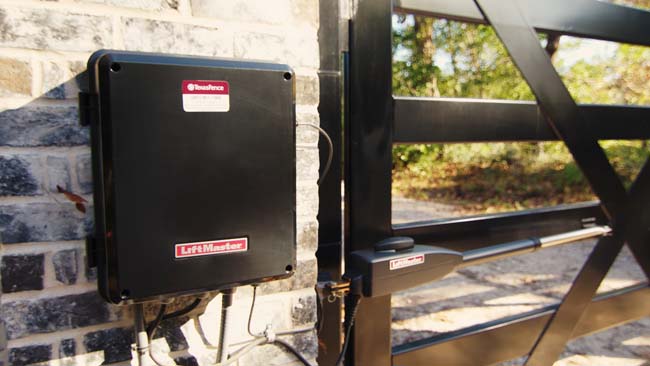The Ultimate Guide to Automatic Gate Installation: Residential and Commercial Options
The security of your home or commercial property should never be compromised. Enhance this by knowing how to optimally integrate an automatic gate into your security plan. The options available for automatic gate installation are broad, from robust sliding gates for businesses to elegant swing gates for residential. In this comprehensive guide, we will navigate through the nitty-gritty of automatic gate installation triumphantly allowing you to enjoy that peace of mind and the curbside appeal that every Texan deserves.

Considerations for Automatic Gate Installation
Installing an automatic gate is a significant investment that requires careful consideration. Before diving into the automatic gate installation process, there are several key factors you should take into account to ensure a successful installation and optimal functionality of your automatic gate.
First and foremost, it’s essential to consider the purpose of your automatic gate. Are you installing it for residential purposes, such as enhancing security or improving the aesthetics of your property? Or are you planning an automatic gate installation for commercial use, where factors like traffic control and access management become critical? Understanding the purpose will help determine the type and specifications of the gate that best suits your needs.
Next, consider the location and layout of your property. If you have limited space or a steep driveway, certain types of gates may not be suitable. On the other hand, if you have ample space and a wide entrance, options such as sliding gates or dual swing gates might be more appropriate. It’s crucial to take accurate measurements of your space and consult with professionals who can provide guidance on what options work best for your specific requirements for an automatic gate installation.
Another important consideration with automatic gate installation is access control. Determine how you want to control entry and exit from your property. This can include options like remote controls, keypad entry systems, intercoms, or even integrating your gate with home automation systems for seamless operation. Think about how convenient it would be to open the gate with a smartphone app while driving up to your property!
Security is also a vital aspect to consider. Evaluate the level of security you need based on your location and personal preferences. Some gates come with additional security features like high-resolution cameras, sensors, and even integration with security alarm systems. Understanding your security requirements will help in selecting a gate that provides peace of mind without compromising functionality.
Lastly, don’t forget about maintenance and durability. Automatic gates require regular upkeep to keep them in optimal working condition. Consider the materials that are best suited for your climate and local environmental conditions. For example, if you live in a coastal area prone to corrosion, choosing rust-resistant materials like aluminum or stainless steel might be preferable. Understanding the long-term maintenance requirements will ensure your gate operates smoothly for years to come.
Understanding Your Space and Design Preferences
Once you have taken into account the considerations mentioned earlier, it’s time to dive deeper into understanding your space and design preferences. Every property is unique, and your automatic gate installation should complement its existing features while reflecting your personal style.
Begin by assessing the architectural aesthetics of your property. Is it modern or traditional? Does it have a specific theme or design? If you have a contemporary-style home, an automatic gate with sleek lines and minimalistic design would likely be the best choice. On the other hand, if your property has a more traditional look, opting for ornate wrought iron gates might enhance its overall charm.
Consider the landscape surrounding your property as well. Are there natural elements like trees, gardens or hills that should be considered when selecting the gate type and design? Balancing the gate with its surroundings can create a harmonious visual appeal. Just as an artist carefully considers their canvas before painting, think of your property as the canvas and the gate as the artwork that completes the picture.
Additionally, think about how you want the gate to function practically and visually. Do you prefer a gate that swings open or slides horizontally? Would you like it to be solid for maximum privacy or incorporate decorative elements for aesthetic appeal? These decisions will influence both the functionality and overall appearance of your automatic gate.
Lastly, consider any customization options available. Many manufacturers offer customizable features such as unique gate designs, personalized monograms or logos, and various finishing options to match your desired color scheme. Embrace your creativity and explore these possibilities to truly make your automatic gate a reflection of your personal taste and style.
By thoroughly considering your space and design preferences, you can ensure that your automatic gate not only serves its functional purpose but also adds value to your property’s overall aesthetic appeal. Now that we have covered these important aspects let’s move on to the next section, which will guide you through the process of selecting the right automatic gate for your needs.
Important Factors To Take Into Account
When considering automatic gate installation, there are several important factors that need to be taken into account. These factors can help ensure that the automatic gate installation is successful and meets your specific needs and requirements.
First and foremost, it is crucial to consider the purpose of the automatic gate. Are you installing it for residential or commercial purposes? Each type of automatic gate installation comes with its own set of considerations and requirements. For residential automatic gate installations, factors such as privacy, security, and aesthetics may play a larger role. Commercial automatic gate installations may require additional features such as access control systems or integration with existing security infrastructure.
For instance, if you’re installing an automatic gate for your residence, you might prioritize privacy and opt for a solid gate design with limited visibility into your property. On the other hand, if you’re installing a gate for a commercial property like a warehouse or office building, you might prioritize security features such as surveillance integration or access control systems.
Next, you’ll need to consider the available space for the automatic gate installation. Automatic gates come in various widths and heights, so it’s important to measure the area accurately to ensure compatibility. Take into account any obstructions such as trees, posts, or uneven terrain that could affect the gate’s functionality or require additional modifications during automatic gate installation.
Budget is another crucial factor to consider. Automatic gates come in a range of materials and designs, each with its own price point. It’s important to determine how much you are willing to invest in the automatic gate installation while balancing your desired features and aesthetics. Remember to also budget for ongoing maintenance costs to keep the automatic gate in optimal working condition.
Lastly, don’t forget local regulations and homeowner association guidelines. Some areas have specific rules regarding fence height, gate design, or automated systems that must be followed. Ensure that your chosen automatic gate installation meets all relevant codes and regulations before proceeding.
By carefully considering these factors before beginning the automatic gate installation process, you can save time, money, and avoid potential complications down the road.
With these important factors in mind, let’s now delve into the detailed steps involved in the installation of an automatic gate.
Detailed Steps in Automatic Gate Installation
Installing an automatic gate may seem like a complex task, but with careful planning and attention to detail, it can be a smooth process. Here are the detailed steps you should follow for a successful automatic gate installation:
- Design and Planning: Start by determining your gate design and functionality requirements. Consider factors such as materials, size, style, security features, and access control systems. This early planning stage will help ensure that your installed gate meets all your needs.
- Gather Permits and Approvals: Check with local authorities and homeowner associations to determine if any permits or approvals are required for your automatic gate installation. Obtain all necessary permissions before proceeding.
- Prepare the Site: Clear the designated area where the gate will be installed from any obstacles or debris. Level the ground if needed and make sure there is sufficient space for the gate to operate smoothly.
- Install Posts and Frame: Begin by digging holes for the gate posts according to specifications provided by the manufacturer or your chosen contractor. Install sturdy posts securely in concrete footings for proper stability of the gate. Next, assemble and install the gate frame onto the posts.
- Attach Gate Panels: Depending on your design choice, attach panels or infills to complete the gate structure. Ensure secure attachment and alignment while following manufacturer guidelines.
- Install Gate Hardware: This step involves installing hinges, rollers, tracks, wheels, or other hardware specific to your chosen automatic gate system. Pay close attention to proper alignment and functionality during this stage.
- Electrical Wiring: If your automatic gate system requires electricity for operation or integrated accessories such as intercoms or security cameras, ensure proper electrical wiring is installed. Consult with a licensed electrician to handle this aspect safely.
- Gate Opener Installation: Install the gate opener system according to the manufacturer’s instructions. This may include mounting the opener on the gate frame, connecting it to power and controls, and programming any necessary settings.
- Safety Measures: Ensure that all necessary safety measures are in place, such as safety sensors, emergency stop features, and warning signs. Test these safety mechanisms thoroughly to guarantee their proper functioning.
- Testing and Adjustments: Once the installation is complete, test the gate’s operation to ensure it opens, closes, and locks smoothly. Make any necessary adjustments to ensure optimal functionality and alignment.
- Regular Maintenance: To keep your automatic gate functioning properly for years to come, establish a regular maintenance routine. This may include lubricating moving parts, checking electrical connections, and inspecting for any wear or damage.
By following these detailed automatic gate installation steps and taking into account important factors, you can achieve an automatic gate installation that meets your needs while adhering to quality standards.
Choosing the Right Automatic Gate Openers
When it comes to choosing the right automatic gate openers for your residential or commercial property, several factors need to be considered. These include the type of gate, your specific needs and preferences, and the level of security required.
Firstly, you should determine the type of gate you have or plan to install. Swing gates and sliding gates are two popular options, each requiring different types of openers.
If you have a swing gate, you will need to choose between an articulated arm opener or an underground opener. Articulated arm openers are mounted on a post and have an arm that swings the gate open, while underground openers are hidden beneath the ground and operate by moving the gate from below. Assessing your space and gate configuration will help guide your decision.
On the other hand, if you opt for a sliding gate, you will have to decide between a chain-driven opener or a rack and pinion opener. Chain-driven openers work by pulling the gate along a track using a chain mechanism. Rack and pinion openers use gears that engage with a rack attached to the gate, allowing for smooth sliding motion.
Consider these choices like selecting between different car models – each has its unique features and advantages that cater to specific needs and preferences.
Furthermore, when selecting automatic gate openers, take into account your specific requirements. Do you prioritize speed? Are noise levels a concern in your neighborhood? Do you need additional security features such as access control systems or advanced locking mechanisms?
For instance, if speed is paramount for your commercial property with high traffic volume, hydraulic openers may be an excellent choice due to their quick operation. However, if noise is a concern in your residential neighborhood, quieter belt-driven or screw-driven openers may be more suitable.
Considering security aspects is crucial as well. If enhancing access control is a priority, you may want to explore openers that offer features like keypads, remote controls, or even smartphone integration for remote operation.
Lastly, it’s essential to ensure compatibility between the gate opener and your power supply. Some openers require a direct electrical connection, while others utilize solar panels or battery backup systems for uninterrupted functionality. Take into account the availability of power sources on your property and select an opener accordingly.
Now that we have explored the various factors involved in choosing automatic gate openers, let’s move on to the next crucial step: selecting a reliable contractor for your automatic gate installation.
Selecting a Contractor for Automatic Gate Installation
Selecting the right contractor for your automatic gate installation is vital to ensure a seamless and successful project. A qualified and experienced contractor for automatic gate installation can help guide you through the process and ensure that your new automatic gate functions efficiently and meets your specific needs.
Firstly, it’s essential to research several potential contractors and gather information about their expertise and track record. Look for contractors who specialize in automatic gate installation and have experience working with similar projects. Customer reviews and testimonials can provide valuable insights into their reputation and customer satisfaction levels.
Imagine you come across a contractor with numerous positive reviews emphasizing their attention to detail, excellent communication skills, and timely completion of projects. This gives you confidence in their abilities to handle your automatic gate installation with utmost professionalism.
Communication is key when selecting a contractor. Reach out to them directly and inquire about their process, timeline, pricing, and any additional services they offer. A reputable contractor for automatic gate installation will be responsive, transparent, and willing to answer all of your questions. They should also be able to provide you with a detailed estimate that includes all costs associated with the installation.
In addition to communication, verify the contractor’s credentials and licenses. Ensure they are properly insured and bonded. This protects both you as the client and the contractor in case of any accidents or damages that may occur during the automatic gate installation process.
Now that you have an understanding of the importance of selecting the right contractor for your automatic gate installation, we can move forward to the final section – operating and maintaining your new automatic gate.
Operating and Maintaining Your New Automatic Gate
Congratulations on the installation of your new automatic gate! Now that you have this convenient and secure feature for your residential or commercial property, it’s essential to understand how to operate and maintain it properly.
Operating an automatic gate is typically straightforward and user-friendly. Depending on the type of gate you have installed, you may have different access options available such as remote control, keypad entry, or even smartphone apps. Familiarize yourself with the specific controls provided with your gate and ensure everyone who will be using it understands how to operate it safely.
For instance, let’s say you have a residential automatic sliding gate with remote control access. You would simply point the remote control at the gate receiver, press the designated button, and watch as your gate smoothly slides open to allow entry or exit.
When it comes to maintenance, regular upkeep is crucial for ensuring the long-term functionality and durability of your automatic gate. Here are some key maintenance tips:
- Keep the track clean: Debris such as leaves, dirt, or rocks can obstruct the movement of your gate along its track. Regularly inspect and remove any obstructions to ensure smooth operation.
- Lubricate moving parts: Periodically lubricate hinges, rollers, and other moving parts of your gate to prevent excessive friction that can lead to wear and tear over time. Consult the manufacturer’s guidelines for suitable lubrication products.
- Check safety features: Automatic gates come equipped with various safety features like photo-eye sensors or pressure sensors to detect obstructions in their path. Test these safety features regularly to ensure they are functioning correctly.
- Inspect electrical connections: Regularly check all electrical connections to make sure they are secure and free from corrosion or damage.
- Schedule professional maintenance: Consider scheduling routine maintenance with a professional service provider experienced in automatic gates. They can perform more in-depth inspections, tune-ups, and address any potential issues before they become major problems.
Remember, safety should always be a top priority when operating and maintaining your automatic gate. Be mindful of people or objects in the gate’s path, and regularly test the safety features to ensure they are in proper working order.
By following these tips and guidelines, you can enjoy the convenience and security of your new automatic gate for years to come.
The Role of Software in Automatic Gate Control
Software plays a pivotal role in the control and functionality of automatic gates. It enables advanced features and customization options that enhance both convenience and security.
One prominent aspect of software control is programming access codes for entry. With the right software, you can establish unique access codes for different individuals or categories such as residents, employees, or delivery personnel. This ensures that only authorized individuals can enter your property through the gate.
For instance, imagine you have a commercial property with multiple tenants. With software-controlled access, you can assign unique access codes to each tenant. This allows you to track who enters and exits the property, providing an additional layer of security and accountability.
Furthermore, software allows for remote access control through smartphone apps or online platforms. This means that even if you’re away from your property, you can still open or close the gate using your phone or computer. Remote access provides added convenience and flexibility.
Another significant aspect influenced by software is gate scheduling. You can program specific times when the gate should open or close automatically. For example, if you run a business with specific operating hours, you can schedule the gate to open at the start of business and close at closing time without manual intervention.
In addition to access control and scheduling, software also enables monitoring capabilities. Some systems provide real-time notifications and logs of gate activities, giving you insights into who used the gate and when. This feature can be invaluable for security purposes or record-keeping.
As technology continues to advance, the role of software in automatic gate control will likely expand with new features and capabilities. It’s essential to stay updated on the latest advancements and consider integrating software solutions that align with your specific needs.








